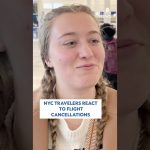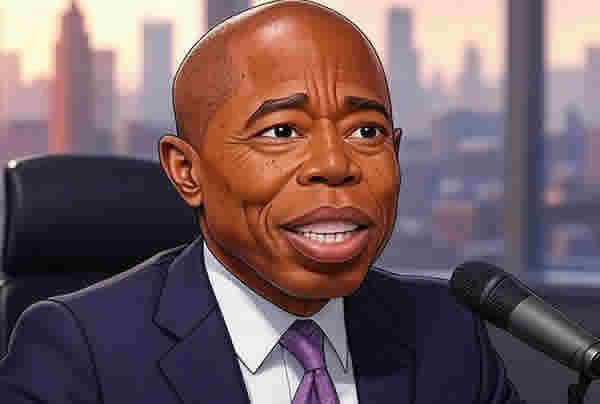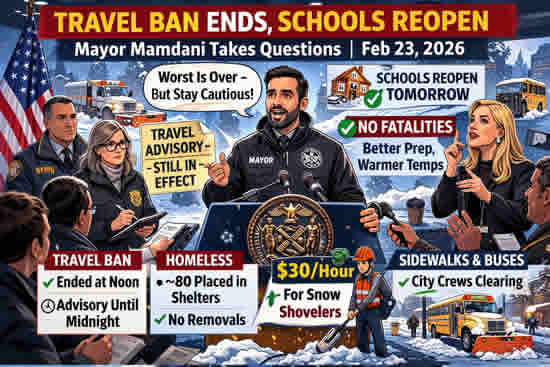In a live 1010 WINS interview, Mayor Eric Adams reassured New Yorkers that Harlem Hospital is safe following the Legionnaires’ outbreak, confirming immediate disinfection of the affected cooling tower. He outlined his controversial new plan to allow medical professionals, with court approval, to mandate treatment for individuals severely impaired by substance abuse, emphasizing public safety and humane intervention despite civil liberties concerns. Adams also addressed a white powder scare at 26 Federal Plaza, affirmed no dangerous substance was found, and spoke on his re-election strategy, highlighting achievements in housing, tax relief, and childcare cost reductions.
Transcript: Mayor Adams Calls In for a Live Interview on 1010WINS “Wins Morning Drive”
Susan Richard: Good morning. It’s Susan Richard with Mayor Adams live on the line with us this morning. Good morning, sir.
Mayor Eric Adams: Good morning. Great to be on with you
Richard: Alright. I know that you want to talk about a plan that you unveiled yesterday to deal with substance abuse here in the city. We are definitely going to discuss that, but I do want to get your thoughts first on our top story this morning, which is the Legionnaires’ outbreak in Harlem.
Many folks are just hearing this morning on 1010 WINS that Harlem Hospital was identified as a source of exposure. So, if somebody needs to go to the hospital or even for the folks who work there, should they feel safe about being at Harlem Hospital?
Mayor Adams: Yes, and they should and that’s why I joined. Dr. Morse yesterday, the commissioner over at the Department of Health and Mental Hygiene and Dr.Katz as well. Because we wanted to send a very clear message, if legionnaires’ is identified in one of the cooling towers within 24 hours of their remediation methods that’s put in place and all the buildings that have been identified, we have partnered with the owners as well as the city to make sure the remediation is done.
Richard: Okay, so the cooling tower that was impacting the hospital, has that been disinfected? What’s the latest?
Mayor Adams: Yes, it has and that is why we go in immediately and you really want to localize the problem and that’s what the Department of Health and Mental Hygiene was able to carry out with the city because of the hospital, but also the private building owners in the area.
So was there a way to prevent this at the hospital, specifically, does the inspection schedule for cooling towers that impact hospitals and other city buildings need to be revisited?
And you know, like every New Yorker that was my question as well. You can inspect it in one day and then the next day the legionnaires’ could be exposed. And just think about it, you could– even when you think about how COVID was. You can test negative for COVID and then within hours you could find out you could have COVID. And so this is not one of those things where because you do the routine inspections like you’re supposed to do and like we do in our city buildings, it doesn’t mean it would prevent it from having legionnaires’ come into that building because of the weather and because of what is actually being exposed
Richard: All right. So if people feel like they may be sick they have symptoms. It’s similar to the flu, they should get to their doctor immediately, yes?
Mayor Adams: Yes, they should if you have flu-like symptoms You should seek medical attention to identify exactly what it is. And if you have respiratory issues or [inaudible] as you feel flu-like symptoms, you should go to your doctor.
Richard: All right, let’s talk about your plan to tackle substance abuse in New York City. This specifically would expand the city’s ability to force somebody involuntarily into treatment. Now the New York Civil Liberties Union, they raised a red flag immediately. They say years of research shows that that’s just not going to work and that instead you need root cause solutions things like affordable housing. So what do you say?
Mayor Adams: Well, we agree with them with root causes and how do you go after them? And that is what we have done and we have done it well. Think about it, a thousand people who are dealing with severe mental health illness, we were able to get them off the subway and go into permanent housing. 2,500 who are on the street, we did the same thing.
What people don’t want to fully acknowledge is that those who voluntarily go in, there’s no problem. We’re giving them houses. We’re giving them the support they need, clubhouses to get the additional support. But you have a small number of people that New Yorkers see every day injecting themselves with drugs on the street, under the influence of drugs, living in our subway system. That small number who are under the influence don’t realize they need care or refuse to take care. We must respond to them. The worst thing you could do is no care at all I would never subscribe to that theory.
Richard: All right, but you say doctors would be the ones to have the ability to seek a court order to mandate treatment. But what is the process? I mean, wouldn’t it be cops who initially flagged somebody and are they qualified?
Mayor Adams: Not at all. It won’t be just cops and it would be based on the law that we’re writing, it would be medical professionals who would make that determination with the judge’s approval. So medical professionals make the determination. We have police officers partnering with our health care professionals because some of these cases can get dangerous.
Remember what happened on 42nd Street where a person stabbed three New Yorkers? He did it and he was under not only a mental health illness, but he was under the influence of substance abuse. So when you take someone into a hospital that is dealing with severe mental health illness and substance abuse, you cannot hold them to address that substance abuse. And we’re saying in some cases we need to do that so New Yorkers are safe and the individuals are safe as well.
Richard: Okay, so the person would then be identified at a hospital?
Mayor Adams: The substance abuse part. An officer can identify someone on the streets who was under severe substance abuse or mental health illness with a practitioner. They would take them to the hospital. The hospital professional would determine if they should be retained because of their substance abuse issue.
Richard: Okay, I just want to ask you this though. You know, we’re in a time in this country when people are worried about losing civil liberties. With that in mind, do you think that this, which would be involuntary, is the right move at this time?
Mayor Adams: Without a doubt. Ask any New Yorker, think about it for a moment. What liberty is it to be on your streets injecting yourself with drugs? Don’t realize how the drugs have consumed your life and the life of your family members and then place you in a position, where you are endangering other New Yorkers. Those are part of the liberties that New Yorkers have a right to they have a right to be on the subway system without someone shoving them to the tracks. They have a right to go into their homes without someone sitting on their stoop injecting themselves with drugs. And yes, we’re not going to take away anyone’s liberty, but we’re going to give people the help they need just as I did in 2022 with the involuntary removal of those with severe mental health illness and lawmakers finally agreed with me that this was the right thing to do.
Richard: All right. So speaking of lawmakers, this would still need approval in Albany, correct? Do you think you’re gonna get it?
Mayor Adams: Yes, I do. Remember there was a great deal of pushback when I was talking about involuntary removal for those with severe mental health illness that didn’t realize they needed help, some were not they were not on their medication. There were a lot of criticism by advocacy groups, but now people have come around and realized that you are not treating people in a humane way if you’re walking past them on the street and they can’t take care of themselves either for mental health illness or substance abuse.
Richard: All right, let’s talk about yesterday’s situation at 26 Federal Plaza. That was kind of scary with those five envelopes with white powder. What is the timeline now for getting back those test results? Do you know?
Mayor Adams: We’re told the preliminary results indicate that there was no dangerous substance that was involved, I was briefed by Deputy Mayor Kaz Daughtry who was on the scene, but let’s be clear, this still is a serious crime. And the Federal Bureau of Investigation I’m told is going to conduct their investigation and anything we can do to assist we would do so. This was a crime, it should not have happened, and we’re going to make sure the person that’s responsible will be brought to justice.
Richard: All right. So I got to ask you one last question two and a half months away from Election Day, polls are showing that you’re not doing so great. What do you think you need to do to get those votes in November?
Mayor Adams: You know people often say that Eric, you know, New Yorkers know you. They know my name. They don’t know the success we have done in the city. I hear it all the time when I’m at town halls or community meetings. They don’t realize that we built more affordable housing in individual years than in recorded history.
They don’t realize that low-income New Yorkers are no longer paying income tax because of what we’ve done and decreasing the cost of child care by 90 percent. Paying off medical debt. We spent 80 million dollars paying off medical debt and we’re going to spend billions doing so. I have to now tell my story. And when you’re the mayor and people don’t know your story and your turnaround story, they tend to believe that the city has not moved in the right direction. Bond raters have indicated other New Yorkers are going to learn this story in the next two and a half months and we’re looking forward to it. But it’s what I love doing and that’s talking to New Yorkers.
Richard: All right mayor. Thank you for talking to us this morning. We appreciate it.
Mayor Adams: Thank you. Take care.
August 15, 2025 Manhattan, New York
Sources: NYC.gov , Big New York News BigNY.com














